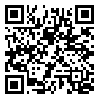Volume 19, Issue 4 (Winter 2025)
jmed 2025, 19(4): 1019-1041 |
Back to browse issues page
Download citation:
BibTeX | RIS | EndNote | Medlars | ProCite | Reference Manager | RefWorks
Send citation to:



BibTeX | RIS | EndNote | Medlars | ProCite | Reference Manager | RefWorks
Send citation to:
Khaje Hosaini S, Khayatan M, Sadeghi H, Ebrahimi F. Ethical Challenges of Applying Advanced Technologies in Medical Education: A Scoping Review. jmed 2025; 19 (4) :1019-1041
URL: http://jmed.ssu.ac.ir/article-1-1536-en.html
URL: http://jmed.ssu.ac.ir/article-1-1536-en.html
Department of Technological Entrepreneurship, Faculty of Entrepreneurship, University of Tehran, Tehran, Iran & Shahid Sadoughi University of Medical Sciences, Yazd, Iran , khayatan@ut.ac.ir
Abstract: (1377 Views)
Introduction: The integration of advanced technologies into the medical education system, while bringing extensive achievements and advancements, has also introduced significant challenges, including vital ethical issues. Therefore, the present study was conducted to review the ethical challenges of modern technologies in medical education.
Method: This study is a scoping review conducted in five stages based on the PRISMA-ScR guidelines. The strategy follows a five-step framework: identifying the research question, identifying relevant studies, screening and selecting studies, extracting and processing data, and summarizing and reporting results. Data was collected from three databases: Scopus, Web of Science, and PubMed on November 25, 2024, without any time or language restrictions.
Results: The study included 35 articles out of 829 found in the initial search. The results showed that the most important common ethical challenges in modern technologies such as artificial intelligence, simulators, big data, information technology, and digital social media included privacy protection, bias, and lack of accountability. In 3D printing technology, ethical challenges also included reduced human interaction and violation of intellectual property rights.
Conclusion: The future of medical education depends on finding an intelligent balance between the use of technology and the preservation of human values. Implementing clear laws and regulations, designing and implementing practical ethical frameworks, teaching ethics-oriented technology skills to students, and continuously monitoring outcomes can pave the way for responsible, fair, and ethical use of modern technologies in medical education.
Method: This study is a scoping review conducted in five stages based on the PRISMA-ScR guidelines. The strategy follows a five-step framework: identifying the research question, identifying relevant studies, screening and selecting studies, extracting and processing data, and summarizing and reporting results. Data was collected from three databases: Scopus, Web of Science, and PubMed on November 25, 2024, without any time or language restrictions.
Results: The study included 35 articles out of 829 found in the initial search. The results showed that the most important common ethical challenges in modern technologies such as artificial intelligence, simulators, big data, information technology, and digital social media included privacy protection, bias, and lack of accountability. In 3D printing technology, ethical challenges also included reduced human interaction and violation of intellectual property rights.
Conclusion: The future of medical education depends on finding an intelligent balance between the use of technology and the preservation of human values. Implementing clear laws and regulations, designing and implementing practical ethical frameworks, teaching ethics-oriented technology skills to students, and continuously monitoring outcomes can pave the way for responsible, fair, and ethical use of modern technologies in medical education.
Type of Study: Review |
Subject:
Medical Education
Received: 2024/12/28 | Accepted: 2025/03/8 | Published: 2025/03/16
Received: 2024/12/28 | Accepted: 2025/03/8 | Published: 2025/03/16
Send email to the article author
| Rights and permissions | |
 |
This work is licensed under a Creative Commons Attribution-NonCommercial 4.0 International License. |







